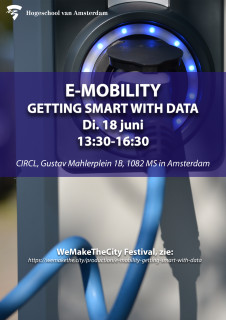Op 18 juni presenteert het team van IDO-laad (Hogeschool van Amsterdam, lectoraat energie en innovatie) de uitkomsten van 5 jaar onderzoek naar elektrisch rijden in Nederland.
Antwoorden op de volgende praktijkvragen komen aan bod:
• Waar Waarom Welke laadpaal neerzetten?
• Hoe zorgen we dat er voldoende laadinfrastructuur is voor de verwachte groei van elektrische auto’s?
• Wat werkt beter: vraag-gestuurd of strategisch laadpalen neerzetten?
• Hoe kunnen we ervoor zorgen dat de belasting van het elektriciteitsnet beheersbaar blijft?
• Welke mogelijkheden biedt Vehicle-to-Grid?
“E-mobility, getting smart with data” - 18 juni 2019- 13:30-17:30 uur – CIRCL Amsterdam
Komt u ook? Kosteloos aanmelden kan via: i.d.visser@hva.nl.
E-mobility: getting smart with data





